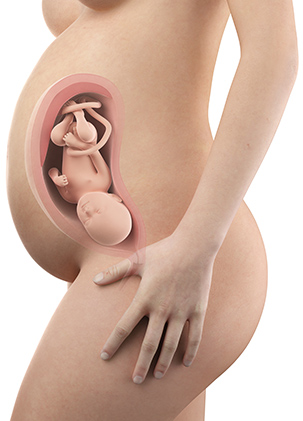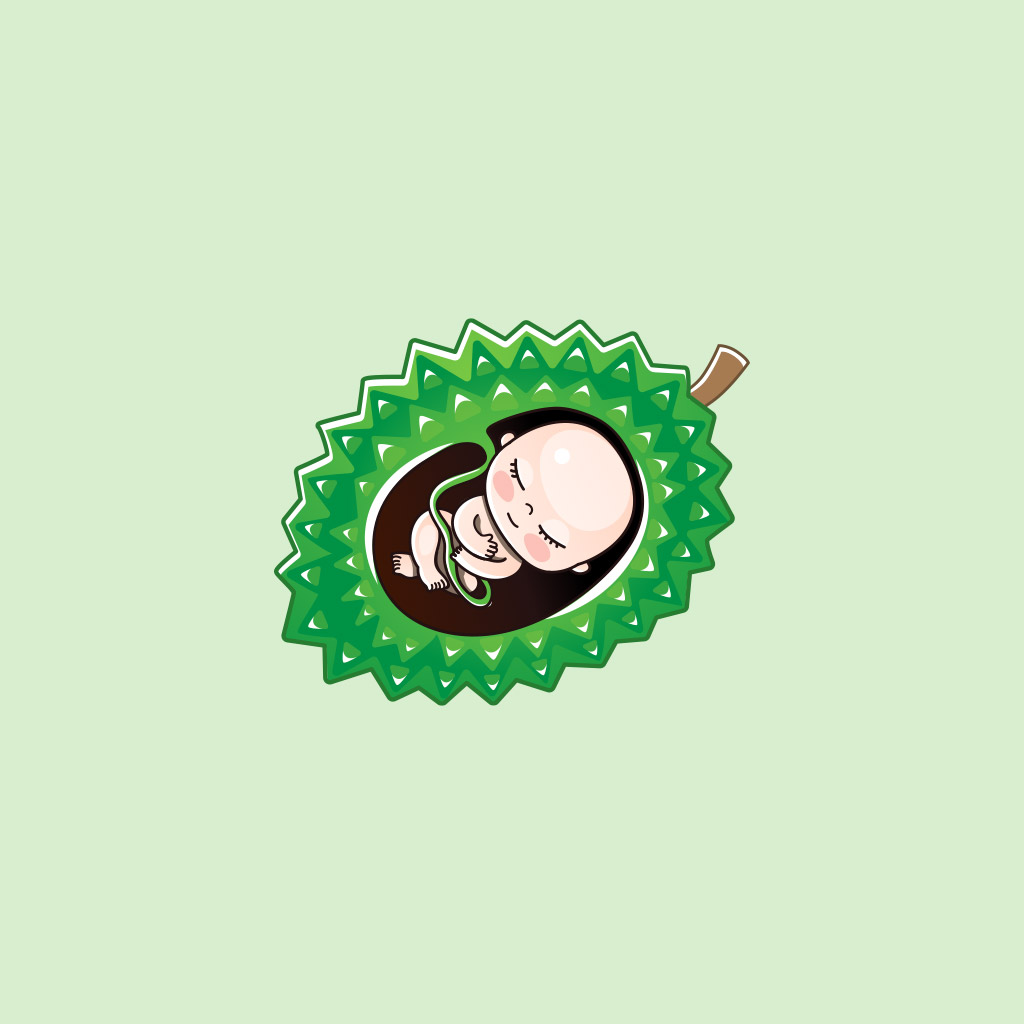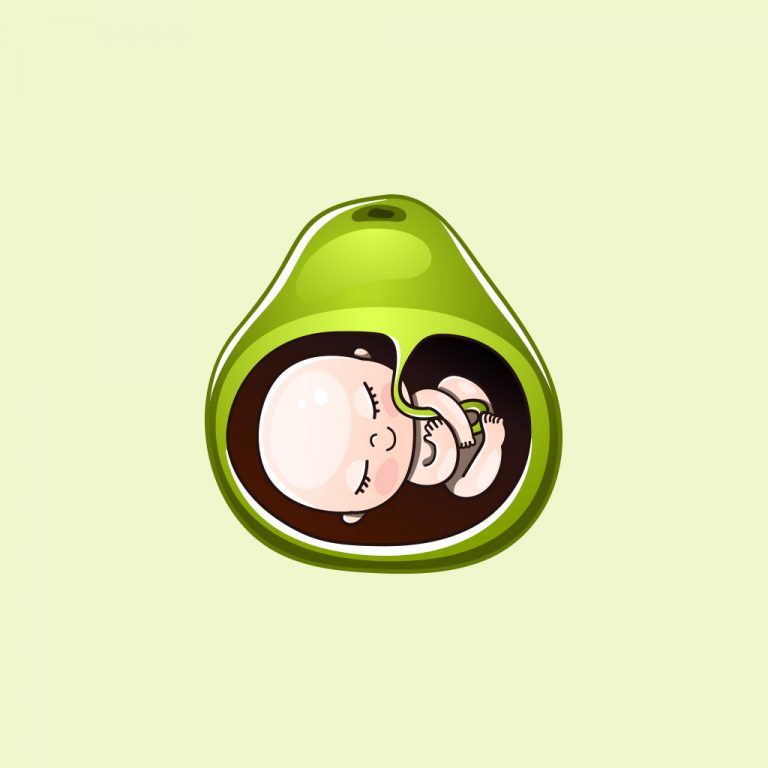Welcome to Week 31! You’re now deep into the third trimester, and your journey is entering its final, exciting stages. At this point, you may be feeling a mix of anticipation, joy, and maybe even a little tiredness. All of this is completely normal, and it’s a sign that both you and your baby are working hard to prepare for the big day.
Your baby is growing steadily, now about the size of a coconut. Most of their major development is done, and they’re spending this time gaining weight, practicing movements, and getting ready to thrive outside the womb. They may be moving around quite a bit — you might notice jabs, rolls, or even rhythmic hiccups. Each kick and twist is a sign of your baby’s healthy progress.
.
You might find yourself feeling more breathless now, as your growing belly puts extra pressure on your lungs and diaphragm. Sleeping comfortably can also become a bit of a challenge, but simple tricks such as propping yourself up with extra pillows or lying on your side can help. Be gentle with yourself and take breaks when you need them. Listening to your body is especially important during these next few weeks.
- Practice relaxation: Breathing exercises, gentle prenatal yoga, or a warm bath can help soothe both body and mind.
- Get organized: Now is a great time to finalize your birth plan, pack a hospital bag, and double-check your list of things to bring for labor and delivery.
- Monitor baby’s movements: Try to notice patterns in your baby’s activity. If you think your baby is moving significantly less than usual, don’t hesitate to call your healthcare provider.
As the weeks go by, remember you’re doing a wonderful job. The feelings, changes, and even the worries you may have are all part of preparing to meet your baby. Trust in your body, and never hesitate to reach out to your doctor or midwife with any concerns. You’re not alone in this journey—support, reassurance, and care are always within reach.
Your Baby’s Development This Week
This is such an exciting time—your baby is truly blossoming in week 31! While you may be counting down the weeks until you meet your little one, amazing changes are happening right now inside your belly. Let’s take a closer look at what your baby is up to this week and how these developments are preparing them for life outside the womb.
At 31 weeks, your baby has grown to about the size of a coconut. That means they’re now around 3 to 3.75 pounds (1,700 grams) and about 16 to 16.5 inches long from head to heel. But it’s not just about getting bigger—important milestones are happening both inside and out!
- Brain Power: Your baby’s brain is making huge leaps right now! As brain tissue matures and develops more grooves, your baby is beginning to process information and even regulate their own body heat. This rapid brain growth lays the groundwork for learning, memory, and movement after birth.
- Getting Ready to See the World: The visual system is almost fully formed. Your baby can open and close their eyes, and their tiny pupils actually respond to light now. If you shine a flashlight on your belly, there’s a good chance your little one will sense it and may even turn their head.
- Developing All Five Senses: By week 31, your baby’s senses—sight, sound, taste, smell, and touch—are all working. Inside the womb, your baby responds to the sounds of your voice, music, and even your heartbeat. This is a wonderful time to start talking, reading, or playing music—they might just remember these soothing sounds after birth!
- Bones and Body: While most of your baby’s bones are hardening, the skull remains soft and flexible to make birth easier. New layers of fat are building under the skin, giving your baby a plumper appearance and storing energy for the first days after birth. Their hands and feet are now fully formed, right down to those tiny, soft fingernails and toenails.
- Movement Changes: If you’ve noticed your baby’s movements feel different recently, you’re not imagining it! There’s less room to stretch out, so big kicks may turn into more rolls, wiggles, or gentle pushes. Don’t be surprised if you spot a little foot or elbow pressed out against your belly from time to time.
Each step this week gets your baby stronger and more prepared for their big debut. Even if you’re experiencing some aches and extra bathroom trips, remember: your baby is busy practicing the skills they’ll use to snuggle, nurse, and interact with you very soon. Take comfort in knowing your care helps your little one grow just right—and that every wiggle, stretch, and hiccup is a happy sign that your baby is doing well.
You’re both doing an amazing job. Keep nourishing yourself, getting rest, and enjoying these precious final weeks together!
Changes in the Mother’s Body
By week 31, you’re well into the home stretch of pregnancy, and your body is working overtime to support your growing baby. With so much happening inside, it’s normal to notice many changes – some surprising, some a little uncomfortable, and most of all, reminders of the incredible journey you’re on.
Here are some common experiences and what they mean for you right now:
- Uterus Expansion: Your uterus is now big enough to be felt more than four inches above your belly button. You might find your belly looks noticeably rounder or feels heavier each week. Everyday activities like sitting up or rolling over may require a little more effort, and you might discover creative ways to get comfortable!
- Breathing Changes: As your uterus continues to grow, it pushes upward, crowding your lungs. This can make you feel slightly out of breath, especially after walking up stairs or standing for long periods. If you find yourself pausing more often, know that it’s normal and taking things slow is perfectly okay.
- Physical Discomforts: By now, sleeping through the night might seem like a challenge. Feeling achy in your lower back, needing to use the bathroom more often, or waking up with leg cramps is all part of your body’s adjustments. Consider using multiple pillows to support your back and legs, and try gentle stretching before bed to help with leg cramps.
- Swelling and Waddle: Some women notice more swelling in their feet and ankles at this stage, especially by day’s end. You may also notice your walking style softening into a “waddle” as your balance shifts and belly grows. Supportive shoes, elevating your feet, and rest breaks can help manage this.
- Nail and Skin Changes: Pregnancy hormones can lead to faster nail growth, but they may also become more brittle. You might notice your skin feels drier or is prone to stretch marks, especially on your belly, breasts, or thighs. Keeping up with a moisturizing routine and staying hydrated is helpful.
- Energy Levels: Many women notice their energy dipping at this point, especially if sleep is interrupted. Listen to your body and rest whenever you can. Even short naps or quiet time off your feet can make a difference.
- Breasts Preparing for Feeding: Your breasts may feel heavier, more tender, or even leak a little colostrum (a yellowish fluid that’s the first milk). This is your body practicing for breastfeeding, and it’s completely normal if it happens.
- Emotional Shifts: It’s common for emotions to run high as you anticipate meeting your baby. Some days you might feel joyful and full of excitement, while others might bring a little worry or impatience. Remember, these feelings are all part of the process, and reaching out to loved ones or your care team for support is always encouraged.
Each of these changes is a sign your body is doing the amazing work of nurturing new life. If you notice anything that feels unusual – like sudden swelling, severe headaches, or changes in vision – call your healthcare provider right away. Trust your instincts, continue to take gentle care of yourself, and give yourself credit for all that your body is accomplishing this week.
Medical Checkups and Health Monitoring at 31 Weeks Pregnant
At 31 weeks along, regular checkups are especially important for both you and your baby’s health. The focus now is on keeping a close eye on how your pregnancy is progressing and ensuring your baby is getting everything needed for a strong, healthy start. Here’s what you can expect at this stage:
- More Frequent Prenatal Visits: Your healthcare provider will likely ask you to come in every two weeks now. These visits help your doctor notice any new changes and catch problems early.
- Blood Pressure Checks: Your blood pressure will be checked at each visit. This is part of watching for conditions like preeclampsia, which can develop later in pregnancy.
- Urine Tests: Your urine may be tested for protein and sugar. Protein in your urine can be a sign of preeclampsia, while high sugar levels can help screen for gestational diabetes if it hasn’t already been checked.
- Measuring Your Growing Belly: Your doctor will use a tape measure to see how much your belly has grown since your last visit. This helps track your baby’s growth and makes sure everything is on track.
- Listening to Baby’s Heartbeat: At each appointment, your provider will listen to your baby’s heartbeat. Hearing those strong little beats is always reassuring and shows that your baby is doing well.
- Discussing Baby’s Movements: Your doctor may ask about your baby’s kicks and rolls. It’s helpful to notice patterns during the day. If your baby is less active, be sure to tell your provider—it could mean your baby needs a little extra attention.
- Swelling and Signs to Watch For: Your doctor may check your ankles, hands, and face for swelling. Some swelling is normal, but sudden puffiness or headaches could indicate a problem, so always share these symptoms.
- Special Checks for Twins or Multiples: If you’re carrying more than one baby, you might get an ultrasound or a non-stress test to closely monitor your babies’ well-being and how they’re sharing space and nutrients.
At this point, it’s also a good time to ask your doctor about any questions or worries, like strange aches, trouble sleeping, or emotional ups and downs. No question is too small. Your provider is there to support both your physical and emotional health all the way to delivery.
As your body keeps changing, regular checkups are the best way to ensure you and your baby stay safe and strong in these final weeks. You’re doing such an amazing job, and your healthcare team is right beside you every step of the way.
Nutritional Tips and Physical Exercise
At 31 weeks pregnant, every bite you eat and every gentle move you make can help support your baby’s continued growth and your own well-being. Let’s look at some practical, week-specific tips to help you feel your best during this home stretch.
- Prioritize Iron and Omega-3s: Your baby’s brain and blood are developing quickly now. To support this, include iron-rich foods like lean beef, lentils, spinach, and fortified cereals. Add omega-3s found in fish (like salmon or sardines), walnuts, or flaxseeds — these help with your baby’s rapidly growing brain.
- Choose Colorful Fruits and Vegetables: Each day, try to eat a rainbow of produce. Bright fruits and veggies — such as carrots, berries, dark leafy greens, and sweet potatoes — deliver vitamins and antioxidants for you and your baby. Snack on carrot sticks or a handful of blueberries for added nutrients.
- Calcium Matters: Your baby’s bones are hardening, so calcium is vital. Include dairy products like yogurt or cheese, or try fortified plant-based milks and canned sardines with soft bones if you don’t eat dairy.
- Small, Frequent Meals: Your growing uterus can put pressure on your stomach, making large meals uncomfortable. Eating smaller, more frequent meals can help you avoid heartburn, keep your energy up, and offer steady nutrition to your baby.
- Limit Excess Salt and Sugar: It’s tempting to reach for salty or sweet treats, especially if you’re feeling tired. Try to keep these to a minimum—too much salt can worsen swelling, and too much sugar can drain your energy.
Along with nourishing food, gentle movement is important for your comfort, mood, and even a smoother delivery.
Here are some exercise ideas tailored to this stage:
- Daily Walks: You may notice it’s harder to get around, but even short walks—indoors or outside—can boost circulation, ease swelling, and help you sleep better at night. Take your time, rest as needed, and enjoy the fresh air.
- Stretch and Strengthen: Gentle stretches or pregnancy-safe yoga videos can relieve back and hip tension. Focus on moves that stretch your lower back, hamstrings, and calves. Using a stability ball for simple seated exercises can also help with posture and balance.
- Pelvic Floor Exercises: Doing Kegel exercises helps strengthen the muscles you’ll use during birth and recovery. Squeeze the muscles you’d use to stop urine flow, hold for a few seconds, then release. Aim for a few sets each day.
- Stay Hydrated During Activity: Even light exercise increases your need for water. Keep a water bottle handy, especially if you walk or stretch for more than 10 minutes.
- Listen to Your Body: Some days you’ll have more energy than others—and that’s okay. If you feel dizzy, short of breath, or notice swelling gets worse with activity, take a break and mention it to your healthcare provider.
Remember, nourishing foods and gentle movement are just as important as rest as you get ready for the exciting weeks ahead. Your body is doing something amazing, and every small effort you make now will help both you and your baby stay healthy and strong.
Weekly Checklist
You’re now 31 weeks along—well into your third trimester! Each week brings new changes, both exciting and challenging. Here’s your checklist to help you stay healthy, organized, and comfortable as you near the home stretch:
- Take short daily walks or do gentle stretches to keep your blood flowing and ease aches—just don’t push yourself if you feel tired.
- Stock up on easy, healthy snacks like yogurt, nuts, or cut fruit. These are perfect for when hunger strikes between meals or at night.
- Read up on the signs of preterm labor (such as persistent cramps or leaking fluid), so you know what to watch for—just in case.
- Write down questions or symptoms you notice during the week to talk to your doctor about at your next visit. Keeping a small notebook handy can help.
- Try using a footstool when sitting to help with swelling and reduce pressure on your legs and feet.
- Arrange for help after your baby arrives—talk to loved ones who might assist with meals, chores, or just some good company during your first weeks at home.
- Wash and sort baby’s clothes and bedding. It’s a great way to nest and avoid last-minute laundry rushes later.
- Begin practicing timed relaxation sessions (just 5–10 minutes a day) with deep breathing or guided meditation—these can help you manage stress now and during labor.
- Review your health insurance coverage for labor and delivery so there aren’t any surprises. Call your provider if you have questions about what’s included.
- Pick out a pediatrician if you haven’t already. Many offices offer meet-and-greets, so you can feel confident about your choice.
- Spend some time bonding with your baby. Gently massage your belly, play soothing music, or just talk and sing to your little one—they can hear you now!
Remember, every pregnancy is unique. Listen to your body, be kind to yourself, and reach out to your provider if you ever feel unsure about anything. You’re doing a wonderful job getting ready for the baby’s arrival!
When to Call Your Provider
Every pregnancy is unique, and it’s always better to speak up if something feels off. Some symptoms are a normal part of this stage, while others could signal that you or your baby need extra attention. Here are some signs at 31 weeks that should prompt a call to your doctor or midwife—just to be safe and ensure the healthiest possible outcome for both you and your baby.
- Sudden swelling: While mild swelling in your feet and ankles is common, call your provider right away if you notice quick, severe puffiness in your face, hands, or around your eyes, or if swelling comes with headaches or vision changes.
- Persistent headaches or blurred vision: If you get a severe headache that won’t go away, see flashing lights, or have blurry vision, get in touch with your care team. These could point to pregnancy-related high blood pressure.
- Painful contractions or pressure: Regular tightening or cramping in your belly, especially if they don’t fade with rest or water, might mean labor is starting early. Tell your provider about any discomfort that feels like strong period cramps or comes with back pain or pelvic pressure.
- Leaking fluid: If you notice any liquid trickling or gushing from your vagina (and it doesn’t seem like urine), call your doctor. Your water may have broken, and it’s important to get checked right away.
- Bleeding: A small spot after a cervical exam may be normal, but if you see blood that’s more like a period or are passing clots, call promptly. Heavy or ongoing bleeding is always a reason to get immediate advice.
- Changes in your baby’s movements: By now, you know your baby’s usual activity patterns. If your baby is kicking or moving much less than usual, or if you notice a significant drop in activity, let your care team know.
- Fever or unusual illness: If you develop a fever, chills, or symptoms of infection (like a painful, burning sensation when peeing or a cough that won’t quit), check in. Many infections need timely treatment during pregnancy.
- Shortness of breath or chest pain: Some breathlessness is expected as your baby grows, but if you suddenly can’t catch your breath, feel chest pain, or if it gets much worse than normal, seek help right away.
- Severe abdominal pain: Any sharp, continuous pain or tenderness that doesn’t ease up with rest deserves a phone call—trust your instincts if something feels very wrong.
- Signs of preterm labor: Watch for symptoms like vaginal pressure, new or increased backache, cramps, or a change in vaginal discharge (especially if it becomes watery, mucousy, or tinged with pink/blood).
Remember, if you’re ever unsure, it’s perfectly okay to call your doctor’s office—even for peace of mind. Your questions and concerns are never a burden. You’re not alone in this, and your well-being matters!
Preparations for Baby
This week is a great time to focus on both your emotional well-being and practical ways to get your home ready for your baby’s arrival. Feeling a mix of excitement and nervousness is perfectly normal—you’re getting so close!
- Create a calming space: Set aside a quiet, cozy spot in your home where you can relax and picture holding your baby. This could be a comfy chair in the nursery or a corner of your living room. Fill it with things that soothe you, like a soft blanket or gentle music.
- Start nesting together: If you have a partner, involve them in simple tasks like washing baby clothes, arranging diapers, or picking out their “coming home” outfit. These small moments can help you both bond and feel more ready.
- Write your thoughts: Consider jotting down hopes, dreams, or special messages for your baby in a journal. This is a meaningful way to connect with your little one, even before birth.
- Set up essentials within reach: Stock up on basics you’ll need right away, such as newborn diapers, wipes, swaddle blankets, burp cloths, and a few simple onesies. Try organizing these in baskets near where you’ll feed and care for your baby to make those first days smoother.
- Keep important contacts handy: Make a list of phone numbers for your doctor, hospital, close family members, and friends who you can count on for support once baby arrives. Post it somewhere visible.
- Delegate and accept help: If friends or family offer to help set up the nursery, run errands, or bring a meal, let them. Building your support system now will help you rest and recover more easily after your baby is born.
- Practice positive self-talk: Remind yourself that you don’t have to be perfect. Trust your instincts, and know that you and your baby are learning together. Celebrate each step, even the small ones.
Taking time to prepare both your space and your heart helps build confidence for the weeks ahead. Remember, it’s okay if not everything is “perfect”—your love and care matter most. You’re doing a wonderful job getting ready for your baby!
Citations and References
- American College of Obstetricians and Gynecologists (ACOG) – Provides comprehensive guidance on prenatal care and recommendations for appointment schedules in the third trimester. Visit Source
- Centers for Disease Control and Prevention (CDC) – Details fetal development milestones, maternal changes, and pregnancy nutrition throughout the third trimester. Visit Source
- Mayo Clinic – Weekly pregnancy guide describing fetal growth, maternal body adaptations, and symptom management for week 31. Visit Source
- Cleveland Clinic – Offers insights on fetal size, maternal symptoms like breathing changes, and sleep disruptions specifically during week 31 of pregnancy. Visit Source
- National Institutes of Health (NIH) – MedlinePlus – Covers prenatal growth patterns, common third trimester physical complaints, and fetal movement recommendations. Visit Source
- World Health Organization (WHO) – Offers global recommendations on antenatal care, nutrition, exercise, and maternal health during late pregnancy. Visit Source










